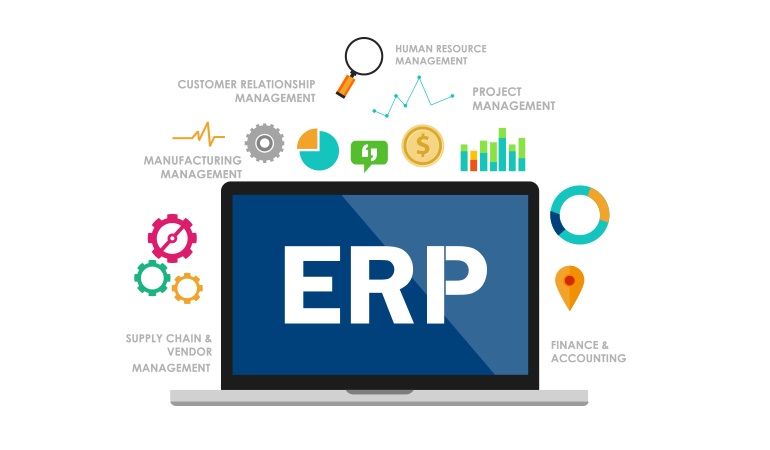ERP is an acronym for Enterprise Resource Management, the consolidated method of storing and managing company data in an automated software suite. ERP software provides tools that automate business functions such as development, sales quotation, accounting, and more. ERP encourages the activities of the business in every department. ERP technologies expand how companies manage resources, whether they are raw materials for production or staffing hours for human resources.
History
Even if it did not have that name – “ERP,” businesses have always tried to use enterprise resource management. Companies have always struggled with sacrificing resources elsewhere to balance all their distinct practices.
This meant that companies had to employ extra staff to manage each department for a long time. With no way of checking in, international firms had to rely on outsourced abroad.
The first traces of ERP in manufacturing go back to the economic order quantity (EOQ) model, a paper-based scheduling system. Material resource planning instruments that gradually became tools for manufacturing resource planning replaced EOQ in the late 1960s.
Because of the frequent incorporation of computer software with everyday business operations, modern ERP activities started in the 1990s.
The word, originally coined by the Gartner Community, centered exclusively on modern digital tools that allow manufacturers to manage their supply chain relationships, monitor inventory, automate accounting, and much more. Companies use ERP today in several sectors, not just manufacturing. Besides, ERP software has now been available from cloud-hosted platforms since the early hours.
ERP types by industry
To address their specific needs, there are several different kinds of ERP designed for several industries:
Apparel ERP
When fashion trends and seasons change, the clothing industry has to deal with a great deal of change.
Automotive ERP
To handle inventory management, quality control, and scheduling, auto manufacturers can rely on ERP tools.
Cannabis ERP
This ERP is an all-in-one solution for legal cannabis production, manufacturing, refining, and distribution.
Construction ERP
Construction contractors must remain in charge of manpower, equipment, services, and any subcontractors they have contracted for a job. With construction task management, ERP software helps.
Education ERP
Academic business processes ranging from tuition billing to exam grading are assisted by college and university ERP systems.
Manufacturing ERP
Returning to the roots of ERP, MRP provides planning of output, scheduling of staff and machine workloads, and general control of inventory along the supply chain.
Why is it important to use specific ERP for each industry?
With so many features, a general ERP system will weigh you down. Manufacturers, for example, need raw material procurement software, whereas the higher education sector mostly requires scheduling resources for students, teachers, and employees. Although a manufacturing plant would still require an ERP with scheduling software, some industries do not need ERP to handle raw materials so this is why it is important to have a specific ERP software for each industry.
Importance of ERP
The effect of these systems is clear, with the global ERP software market estimated to be worth $41.69 billion by 2020. Although that number is amazing, it may be hard for those who have never used the program to understand why ERP is important to their business. However, since globalization is squeezing the market for many sectors, it is important to look for all resources to offer your business this amazing software.
Uses of ERP
Organizations looking to handle their business operations through a centralized and streamlined system often use ERP systems. To help keep track of all the moving parts of production and delivery, ERP is widely used by businesses operating within the supply chain. However, a variety of distinct sectors would use ERP software in Faisalabad, including those in healthcare, non-profit, construction, and hospitality classes.
ERP incentives will all be beneficial for companies that need to control their employees, clients, and inventory.
Advantages of an ERP software
- Process efficiency
- Accurate forecasting
- Department collaboration
- Scalable resource
- Integrated information
- Cost-saving
- Streamlined process
- Mobility
- Increased productivity
- Customer service
Disadvantages
- High cost
- ERP resistance
- Non-customizable system
Why should you invest in this software?
Ultimately, ERP software is still a key ingredient in creating a successful company, even with these drawbacks. The positives of your organization’s implementation of an ERP system outweigh the negative ones because ERP gives your business a competitive and financial boost while enhancing the efficiency, coordination, and communication of the business. The upside to the drawbacks mentioned is that your company can avoid making any of these errors with careful analysis.
ERP Software in Faisalabad
ERP software deals with organizations that are both manufacturing and non-manufacturing. A particular type of ERP platform is optimized for manufacturing industries.
It is also a program for producing ERP. Management systems have been developed to optimize the use of the manufacturer’s facilities, to mitigate net costs, and to manage the entire life cycle of products, from procurement of raw components, production planning, packaging, distribution, pricing to financial settlement.
There are several disadvantages to adopting an ERP strategy for small businesses. For instance, in the early history of the organization, the company might choose to update an older model or one that was manually controlled and labor-intensive.
Many local firms in Faisalabad also use the mended systems or obsolete technology taken over by staff from former employers. For most organizations, especially large ones, the ERP platform is a poor idea in terms of cost and functionality. The leadership job would be as expensive.
Conclusively, this indispensability is exactly what makes the future of ERP technology so bright. There are several components to consider when selecting the right ERP program for vendors. These are optimization, the ability to change existing legacy systems, and the extent of receptiveness of the members of the team would be.

